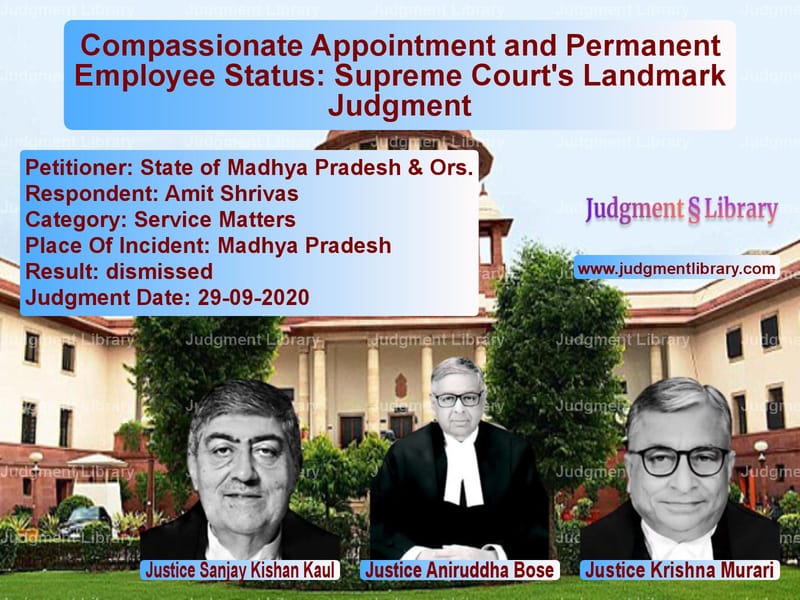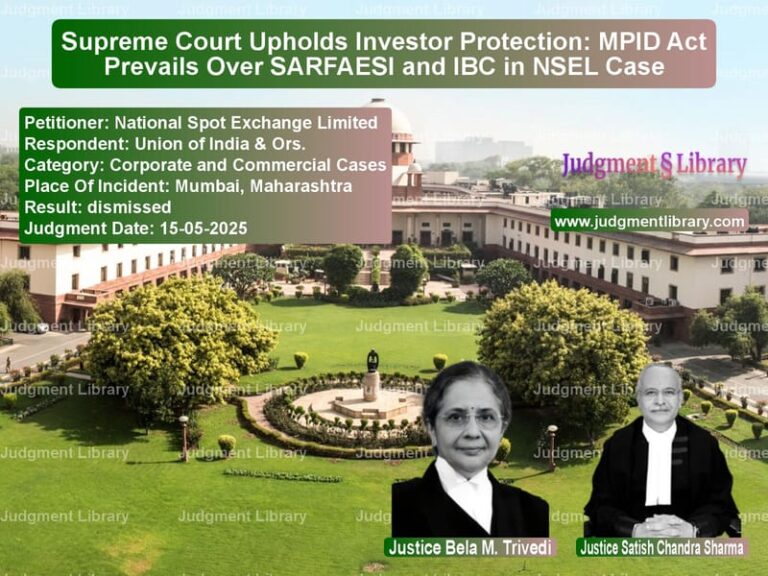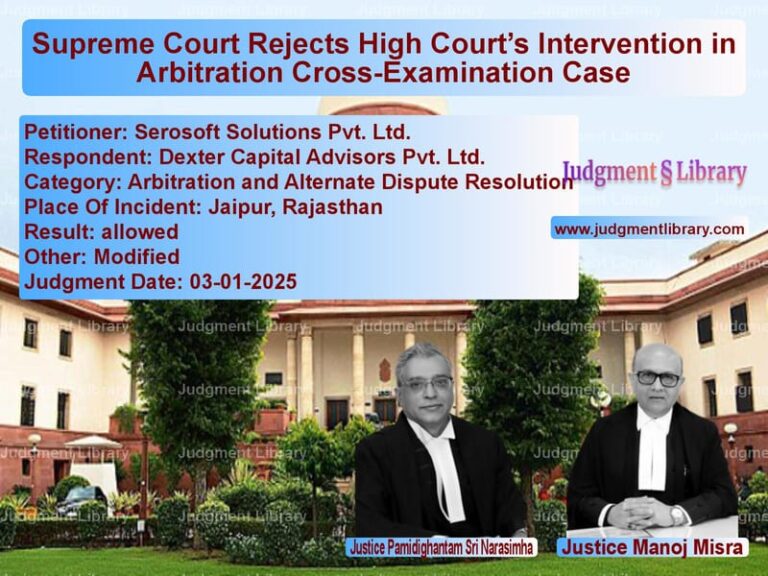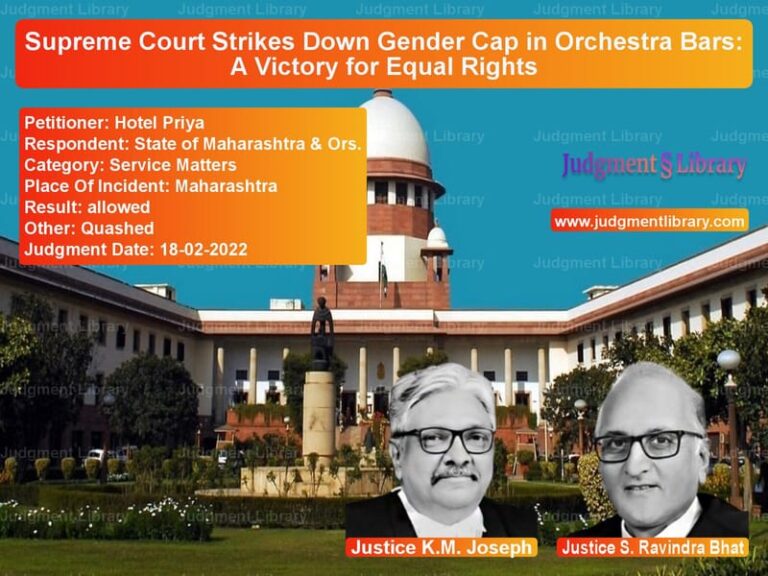Compassionate Appointment and Permanent Employee Status: Supreme Court’s Landmark Judgment
The case of State of Madhya Pradesh & Ors. vs. Amit Shrivas is a crucial judgment regarding the legal entitlement of a government employee’s dependent to a compassionate appointment. The Supreme Court examined whether a ‘permanent employee’ under the Madhya Pradesh (Work Charged and Contingency Paid Employees) Pension Rules, 1979, could be equated to a regular government employee for the purpose of compassionate appointments.
The respondent, Amit Shrivas, filed a claim for a compassionate appointment following the death of his father, Shri Ranglal Shrivas, who had served as a Driver in the Tribal Welfare Department, Madhya Pradesh, from 1984 until his demise in 2009. His request was denied by the government based on the 2008 policy, which only allowed for a one-time financial assistance of Rs. 1,00,000 for work-charged and contingency employees instead of offering employment opportunities.
Background of the Case
Compassionate appointment policies exist to help families of deceased government employees who pass away while in service, ensuring that their dependents do not face extreme financial hardships. However, these appointments are strictly governed by policies in force at the time of the employee’s death.
The late Shri Ranglal Shrivas had been employed in the Tribal Welfare Department for over 23 years. Initially appointed as a work-charged employee, he was later made permanent in 1987 and received salary revisions, krammonati (promotions), and pension benefits. His family, including his wife, son (the respondent), and three daughters, depended solely on his income.
Following his demise, Amit Shrivas applied for a compassionate appointment, arguing that his father’s status as a ‘permanent employee’ entitled him to the benefit. The government rejected his application, stating that work-charged employees were explicitly excluded from such benefits under Clause 12.1 of the prevailing policy.
Petitioner’s Arguments
The State of Madhya Pradesh argued:
- Compassionate appointments are not a right but a policy-based discretion granted only under specific conditions.
- The father of the respondent was a work-charged employee whose salary was paid from contingency funds, making him ineligible for regular government employment benefits.
- The 2008 policy explicitly excluded work-charged employees from compassionate appointments, allowing only financial assistance.
- The respondent’s family had already received Rs. 1,00,000 as per the policy.
- There is a fundamental distinction between a ‘permanent employee’ and a ‘regular employee’. A permanent employee enjoys pension benefits but is not a regular government employee with full service rights.
Respondent’s Arguments
Amit Shrivas contended:
- His father had been employed continuously for over 23 years and was granted permanent employee status in 1987.
- As a permanent employee, he received pension benefits, pay scale revisions, and promotions, making him eligible for compassionate appointment.
- Excluding permanent employees from compassionate appointments violated Article 14 of the Constitution, which guarantees equality before the law.
- The state had granted similar appointments in other cases, and denying him the same benefit was discriminatory.
High Court Ruling
The High Court ruled in favor of Amit Shrivas, stating that a permanent employee under the Pension Rules should be eligible for compassionate appointments. The court directed the state government to reconsider the respondent’s application and grant him a job.
The government challenged this ruling, arguing that the High Court misinterpreted the definition of ‘permanent employee’ and failed to consider the distinction between regular and work-charged employees.
Supreme Court’s Key Observations
The Supreme Court examined the nature of employment and relevant policies. It highlighted the crucial distinction between permanent and regular employees:
“There cannot be any inherent right to compassionate appointment but rather, it is a right based on certain criteria, especially to provide succor to a needy family. This has to be in terms of the applicable policy as existing on the date of demise, unless a subsequent policy is made applicable retrospectively.”
Key observations included:
- Compassionate appointments are an exception, not a right.
- A ‘permanent employee’ under the Pension Rules does not automatically become a ‘regular employee’ under civil service rules.
- The respondent’s claim could not be considered valid, as the policy applicable at the time of death only provided for financial relief.
- The exclusion of work-charged employees from compassionate appointments was a valid policy decision.
Final Judgment
The Supreme Court ruled against the respondent, stating that he was not eligible for a compassionate appointment. However, recognizing the family’s hardship, the Court exercised its powers under Article 142 of the Constitution to enhance the financial relief:
“We are, thus, of the view that it would be appropriate to use our powers under Article 142 of the Constitution of India to do complete justice between the parties by increasing the amount from Rs. 1,00,000/- to Rs. 2,00,000/-.”
The Court directed the state government to pay an additional Rs. 1,00,000, raising the total assistance to Rs. 2,00,000.
Implications of the Judgment
This judgment reaffirmed the principles governing compassionate appointments:
- Government employment policies must be strictly followed.
- The classification of an employee as ‘permanent’ does not equate to ‘regular’ service status.
- Financial assistance policies must be honored in their original terms.
- Article 142 can be invoked to balance legal principles with humanitarian concerns.
With this ruling, the Supreme Court reinforced that compassionate appointments must strictly adhere to policy guidelines in force at the time of an employee’s demise.
Petitioner Name: State of Madhya Pradesh & Ors..Respondent Name: Amit Shrivas.Judgment By: Justice Sanjay Kishan Kaul, Justice Aniruddha Bose, Justice Krishna Murari.Place Of Incident: Madhya Pradesh.Judgment Date: 29-09-2020.
Don’t miss out on the full details! Download the complete judgment in PDF format below and gain valuable insights instantly!
Download Judgment: State of Madhya Prad vs Amit Shrivas Supreme Court of India Judgment Dated 29-09-2020.pdf
Direct Downlaod Judgment: Direct downlaod this Judgment
See all petitions in Employment Disputes
See all petitions in Pension and Gratuity
See all petitions in Termination Cases
See all petitions in Judgment by Sanjay Kishan Kaul
See all petitions in Judgment by Aniruddha Bose
See all petitions in Judgment by Krishna Murari
See all petitions in dismissed
See all petitions in supreme court of India judgments September 2020
See all petitions in 2020 judgments
See all posts in Service Matters Category
See all allowed petitions in Service Matters Category
See all Dismissed petitions in Service Matters Category
See all partially allowed petitions in Service Matters Category







